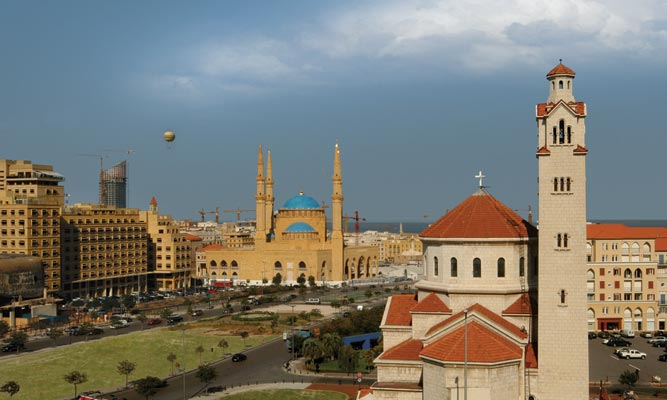
“It has been an explosive situation in the Lebanon for the past four years. But I’m amazed that while Lebanon is on the brink of an explosion the miracle is that there is no explosion,” Michael Zammit, S.J., Jesuit Refugee Service regional director for the Mideast and North Africa, told me in Beirut last week.
His words reflect the fact that the land of the cedars, after experiencing a 15-year civil war (1975-90), finds itself today in the midst of a geopolitical conflict, which is being fought with particular ferocity in neighboring Syria but also by proxy in Yemen. But the fact is the Sunni-Shiite conflict has not spilled over to Lebanon in any significant way so far; the local political forces have not wanted this to happen.
The situation is tense nevertheless as the regional rivalry between Sunni Saudi Arabia and Shiite Iran is strongly felt in this county, a third of the size of Maryland. Hezbollah, the Shiite political party and militia is an ally of Iran, and the main politically organized force in the country; it is able, to a great extent, to dictate the country’s foreign and domestic policy. After taking credit for liberating the south from Israel in 2000, Hezbollah is now playing a significant role in the war in Syria, in consort with Iran and Russia, on the side of Assad regime. Hezbollah’s ever-increasing influence caused Saudi Arabia to cut off $4 billion in military support to the Lebanese army.
Lebanon has been without a president for two years now, due to internal political rivalries. According to the National Pact of 1943, subsequently modified by the Ta’ef Accord of 1989 (which is meant to reflect the numerical consistency of the different ethnic-religious communities), the head of state is to be a Maronite Christian; the speaker of the Parliament is to be a Shiite Muslim; while the prime minister is to be a Sunni Muslim.
Apart from the fact that there has been no major explosion in recent years, the real miracle of Lebanon is to be found in the fact that, despite tensions, Christians and Muslims continue to live together in peace.
St. John Paul II, who visited the country in 1997, said, “Lebanon is more than a country; it is a message.” Indeed, down the centuries, it provided refuge for minorities and today is populated by 18 minorities: 12 Christian communities (six of which are Catholic), five Muslim communities (including Sunni, Shiite, Druse and Alawite) and a Jewish one. While figures are hard to come by (for political reasons, there has been no census for more than a decade), the Christian population is estimated at around 30 percent of Lebanon’s four million population, making it the largest percentage of Christian presence in any country of the Middle East.
Here in Beirut where mosques and churches stand side by side, the 140-year-old Jesuit-run St. Joseph’s University, with 12,000 students (one-third Christian, two-thirds Muslim), has played and still plays an important role in fostering a culture of dialogue and mutual respect, and its alumni have held high positions in the country. Its president, Salim Daccache, S.J., lives in the nearby Jesuit community along with 24 other Jesuits from 12 different nationalities including the former father general of the Society, Hans Peter Kolvenbach. The leadership of Jesuit Refugee Service lives there, too, and has a national and regional office in this complex, from which directs work in the country and in the region, where there are so many refugees.
America magazine
Leave a Reply
You must be logged in to post a comment.